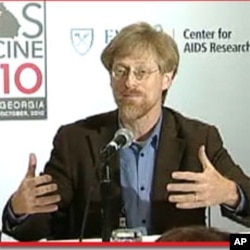On HIV Vaccine Awareness Day Wednesday, vaccine advocates said the world is at the “dawn of a prevention revolution that could finally turn the tide of the AIDS epidemic.”
“This is a day that’s been marked for over a decade now, and first and foremost, it’s day to really honor the trial participants and really everybody involved in the search for an AIDS vaccine,” said Mitchell Warren, head of the AIDS Vaccine Advocacy Coalition [AVAC].
Epidemic turns 30
Warren described vaccine research as a “long and arduous task with dozens of trials big and small all over the world over a number of years. And at the end of the day, without the thousands of men and women, who participate in those trials, we’ll never find an AIDS vaccine.”
It’s been 30 years since the first case of HIV/AIDS of diagnosed.
“Thirty years into the epidemic,” he said, “I actually think that this last year or so is a true turning point for both the search for an AIDS vaccine, as well as, and I think perhaps most importantly, beginning the conversation about how we end AIDS in our lifetime. It’s a conversation we haven’t really had over the last few years because we’ve looked at so many challenges and so many setbacks.”
Encouraging news
However, there’s been encouraging news, not only in recent vaccine research, but also in overall prevention and treatment methods using antiretroviral drug therapy.
“People talk a lot about this idea of a prevention revolution and I actually think it might be sooner than we might have thought,” said Warren.
The most promising vaccine trial to date occurred in Thailand, which involved over 16,000 participants. The results of the Thai prime-boost trial, RV144, weren’t good enough to go to market, but they did prove an HIV vaccine is possible.
“That result is almost 18 months old and there are really two major ways forward with respect to what comes after RV144. On the one hand, a really unprecedented global collaboration has been working with the samples collected in RV144 to try to understand better why that vaccine had the modest effect that it did,” said Warren.
Findings could be released in the coming months and could indicate how the vaccine could be improved.
“The second track of activity is another exciting collaboration of a number of partners, both public sector and industry, trying to build on the results of RV144 in designing two follow-up studies,” he said.
One study will take place in Thailand and the other is expected to be held in southern Africa.
“Now, unfortunately, those trials aren’t even going to start until 2014 or so and that’s just the nature of the challenges and the timelines of developing vaccine candidates,” he said.
Different world
A lot can happen in HIV/AIDS research between now and the start of those trials.
“When those trials do begin in 2014,” said Warren, “it’s going to be a very different landscape, I suspect, because all of this work in AIDS vaccine research is happening at a simultaneous moment in exciting antiretroviral-based prevention and treatment research. And so we’re going to be looking at trials conducted in a much more complex but much more exciting context in the coming years.”
Recently, a study proved that when HIV-positive people adhere to antiretroviral therapy they are much less likely to transmit the virus to their uninfected partners.













